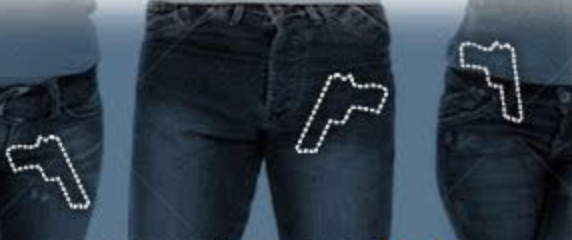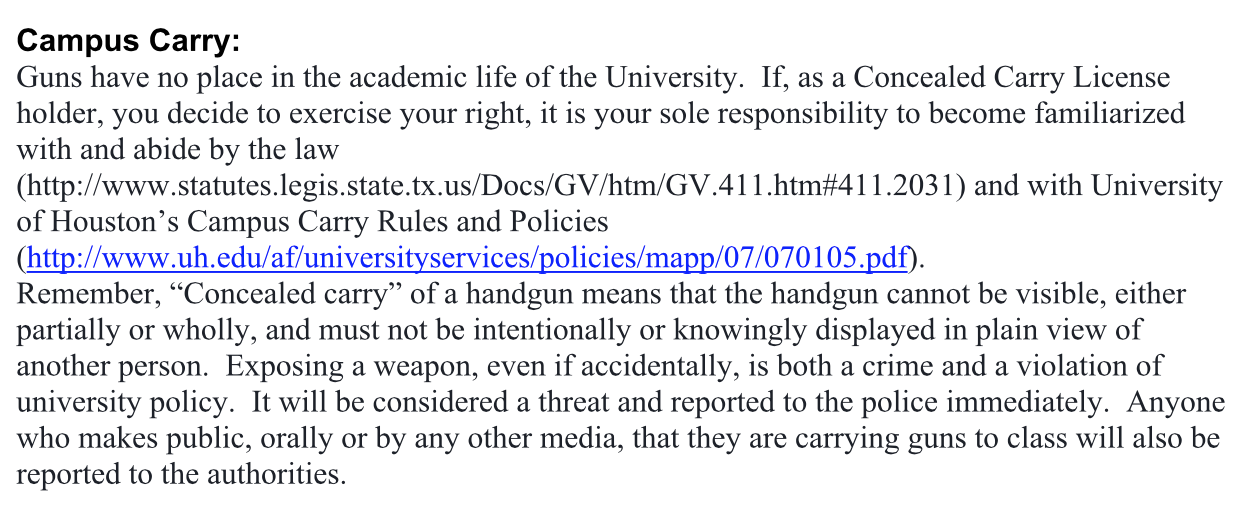You have /5 articles left.
Sign up for a free account or log in.

Students for Concealed Carry
One of the major arguments against campus carry laws like the one imposed on Texas public universities last year is that having guns in the classroom chills academic freedom. Professors might avoid hot-button issues in class discussions, for example, or fear meeting one-on-one with students. But how many faculty members actually feel that way?
Preliminary research being presented today at the annual meeting of the American Educational Research Association gives new insight into what share of professors feel intellectually limited by the specter of guns in their classrooms or would adjust their teaching styles if they had to teach under campus carry.
Some three-quarters (70 percent) of respondents disagreed or strongly disagreed with the statement “I support the right of license holders to carry concealed weapons on campus.” A similar number (71 percent) agreed or strongly agreed that campus carry laws “will have a negative impact on the free and robust exchange of ideas at the my university.”
While there was overwhelming antipathy for campus carry and concern about how it might affect academic freedom institution-wide, responses to questions about how individual professors might alter their own teaching practices were more varied.
Over half of the sample (53 percent) said their approaches to teaching controversial or emotionally charged topics would most likely or definitely stay the same, for example. Thirty-one percent said their practices would most likely or definitely not stay the same, while 15 percent of professors were unsure.
In response to the statement “I expect to omit some topic(s) from my course content,” 58 percent of respondents said they would most likely or definitely not do so. Eighteen percent were unsure, and 23 percent said they probably would omit some topics.
Asked whether they planned to “tone down” their usual approaches to teaching controversial or sensitive topics, 46 percent said they probably would not, while 40 percent said they probably would. The rest were unsure.
Over all, 50 percent said their “ability to effectively teach controversial or emotionally charged topics will be negatively impacted,” while 30 percent said it most likely or definitely would not.
Women tended to be more opposed to campus carry than male respondents were, but not to a statistically significant degree.
Asian participants were more likely than those of other ethnic groups to say campus carry would have a negative impact on their ability to teach controversial issues and that they would change their approach to controversial topics or omit course material under campus carry.
Business professors were more supportive of campus carry than were their peers in other disciplines. Science and engineering and architecture and public affairs participants were significantly less likely than other groups to agree that their approach to teaching controversial issues would remain the same.
For her study, Joslyn Krismer, a Ph.D. candidate in educational leadership and policy studies at the University of Texas at Arlington, sent a survey to 1,333 faculty members at a large Southern research university last spring. The university is unnamed but is presumably in Texas, since questions relate to a forthcoming campus carry policy; campus carry was adopted by universities in August 2016 and will be adopted by community colleges this summer. (Many public institutions objected to the law but must follow it. Many private institutions, which had the option of ignoring it, did.) The response rate was about 24 percent.
Krismer said her findings support existing research suggesting that faculty members are largely opposed to policies that allow licensed firearm users to carry their weapons on college campuses, including in classrooms. They also begin to add some “shading” to such broader findings. For example, she said, campus carry’s effect on faculty members’ ability to teach controversial topics is nuanced, and some groups of professors may be more negatively influenced than others.
Asked about the slight discrepancy between opposition to campus carry and the extent to which professors said they would change their own classroom practices, Krismer said many of the professors she’s engaged on the topic “feel the policy runs counter to the mission and culture of the university.”
Familiar Fears
Krismer’s data were gathered before the new law took effect in Texas last fall, but professors on several campuses said they still ring true months into campus carry.
Maria Gonzalez, an associate professor of English at the University of Houston, said she found the new data “fascinating” but unsurprising.
“The fact that over 75 percent surveyed basically said guns have no business on a campus represents the attitude of most faculty,” she said. Changes in teaching behavior are understandably more nuanced than a survey can capture, though, she said, noting that she’s added language about concealed carry to her own syllabi this year. While she hasn’t changed what she teaches or how she teaches, she reviews the policies governing campus carry “carefully on the first day of class just to make sure everyone understands.”
Here’s the language Gonzalez has included in her queer theory syllabus, for example.

Jonathan Snow, a professor of isotope geochemistry at Houston, famously advised colleagues not to "go there" with an angry student under campus carry, based on preliminary discussions last year within the Faculty Senate, of which he was president. He said the new study was likely based on a survey instrument too "blunt" to capture the complexities of campus carry, but nonetheless called it "a start toward a quantitative and statistically robust investigation of attitudes toward the issue."
One could, for example, "be scared stiff of students carrying, and yet on principle refuse to change ones practice in interacting with students," he said. "From my point of view, the advent of campus carry has changed my perceptions of interactions with students, particularly one-on-one in charged situations," such as negative discussions about grades. Snow said his office hours are now by appointment only, for example.
Mia Carter, University Distinguished Teaching Associate Professor of English at the University of Texas at Austin and co-plaintiff in a lawsuit seeking the right for professors to ban weapons in their individual classrooms, said Krismer’s results “seem to reflect the general impressions that I get from most of my peers.” That’s “trying to proceed as normal, being a bit more careful and more self-conscious, gauging tensions in the classroom a bit more anxiously,” she said. “And for me, the ‘not sure’ answers are also telling.”
Michael Newburn, an Ohio-based spokesman for Students for Concealed Carry, dismissed Krismer’s data as uncompelling, however, and “exactly the kind of thing you’d expect from a bunch of university professors in a state where campus carry is new. … They’re asking a bunch of people to predict how they would act once campus carry is in place, and I don’t personally understand the relevance of that.”
A study conducted in Colorado, Utah or one of the six other states (besides Texas) where campus carry has been practiced “unfettered” for some would likely lead to different answers, he added. And even in Texas, for example, he said, the Houston Chronicle recently ran a news article originally titled “Campus Carry Unrest Fades.” (The article also mentions that some university instructors are seeking out alternative public spaces for office hours for safety reasons, such as bars. Its first line is, “Mark Sheridan [a graduate teaching assistant in English at the Austin campus] says he can't shake the scenario in his head: a student, anxious or angry, suddenly waving a gun in his office.”)
A spokesperson for Austin, where opposition to the law arguably has been the loudest, said via email that this year the campus has seen "two minor incidents" related to campus carry, in which no shots were fired and no injuries were reported. The Houston Chronicle also reported in February that there had been three gun discharges on Texas public campuses during the previous six months, with one incident having a definitive relationship to the new law (that was a negligent discharge at Tarleton State University, which resulted in damage to a dorm room but no injuries).
Both Krismer and Carter said professors still concerned about campus carry in Texas had until recently a new worry: pending state legislation in support of permitless, so-called constitutional carry that would allow anyone 18 and older to carry a concealed weapon. A modified version House Bill 1911 passed by a committee earlier this month, however, bumped the age limit up to 21 and ensured it did not conflict with the campus concealed carry law, according to The Texas Tribune.





